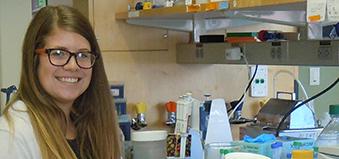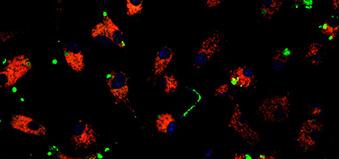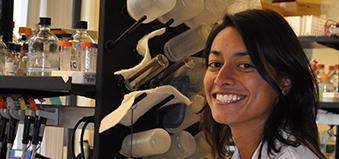Tufts IRACDA Program
Overview
Traditional postdoctoral training focuses largely on providing a postdoc with research tools and a body of research sufficient to launch an independent career. Tufts IRACDA provides the additional skills needed for careers at research-intensive universities as well as schools with greater emphasis on teaching including:
- how to set up and manage a productive research lab
- how to obtain grant funding
- how to develop and teach courses
- how to participate in service activities associated with everyday academic life
What We Provide
IRACDA scholars spend 75% of their time in research, with the remaining time devoted to teaching and career development activities.
In this 4-year program, the first year is funded by the research mentor with Years 2-4 funded by the NIGMS IRACDA grant. An entrant’s first year salary is based upon their mentor’s budget capacity and years of postdoctoral experience. For years 2-4 in the program, we offer competitive salaries recognizing postdoctoral scholars’ value and cost of living in the Boston area, with a starting rate of $77,250+, based on years of postdoctoral experience at the time of the appointment to the IRACDA grant.
Tufts IRACDA provides:
- Up to four years of support, plus travel and supply allowances in the years 2-4
- Outstanding research opportunities in biomedical research fields including but not limited to cell and developmental biology, genetics, molecular biology, microbiology, immunology, neuroscience, biomedical engineering, chemistry, chemical biology, and nutrition
- Workshops on essential skills such as grant and manuscript writing, mentoring, lab management, and scientific presentations as well as coaching throughout the job search process
- Development of teaching skills through mentored assignments as instructor on record for courses at minority-serving institutions in the Boston area and through workshops on teaching methods that encourage active, evidence-based learning.
- Opportunities to mentor junior scientists
- A tight-knit community of postdocs interested in academic careers plus opportunities to network with scholars in other IRACDA programs across the nation.
- An individually tailored mentoring team of faculty to help you stay on track to meet your career goals
- Individual guidance during the job search
- Campus locations in the Boston metropolitan area, a hub of biomedical research in academia and industry as well as a city rich in culture, sports and access to outdoor activities and extensive public transportation.
Applying to Tufts IRACDA
Applicants must by US citizens or permanent residents to be eligible for Tufts IRACDA.
Successful applicants are typically those who are:
- Are passionate about research
- Want to develop skills critical for an academic research career
- Want to gain experience with innovative teaching practices
- Are committed to increasing diversity in the academic environment.
The application deadline for positions beginning Fall 2026 is March 15, 2026. Later applications will be considered on a rolling basis if positions are available.


Research Training & Mentors
Tufts IRACDA scholars may apply to conduct their research with any tenured or tenure-track Tufts University faculty member who is investigating issues related to biomedical science.
Scholars may study on the Health Science Campus in downtown Boston, home to the Schools of Medicine, Dental Medicine, Nutrition, and the USDA Human Nutrition Research Center on Aging, the Medford Campus, home to the College of Arts & Sciences and the School of Engineering, and the Grafton Campus, home to the Cummings School of Veterinary Medicine.
Training in Teaching
IRACDA Scholars prepare and present a semester-long course at one of our partner institutions during their training.
Each Scholar's interests and expertise as well as the needs of our partner schools are considered in selecting the teaching assignment.
This aspect of IRACDA training provides an unparalleled opportunity to gain familiarity with the time and effort that it takes to design and teach a course and the challenges and rewards of teaching a diverse study body.

Meet Our Scholars
Our Scholars pursue research in diverse areas.
Scholar Publications
Publication of research findings is an important part of IRACDA training.
IRACDA Alumni
51 of our 57 (89%) alumni are at institutions of higher education; 44 of the 51 (86%) are in tenure-track positions.
Contact Information
Program Leadership
Mitch McVey, PhD, Program Director
Jamie Maguire, PhD, Co-Director
Claire Moore, PhD, Co-Director
Deborah Esparza-St Louis, MBA, MPA, Senior Research Administrator


